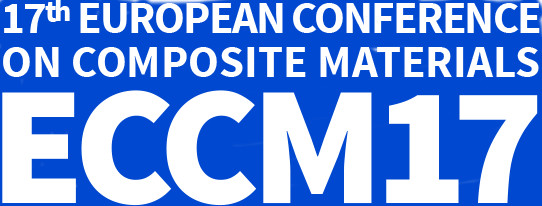

App-Einstellungen:
THE ROAD MAP FROM FRACTURE TOUGHNESS TO RESIDUAL STRENGTH OF AIRCRAFT HIGH GRADE CFRPS
Spyridon Psarras (Imperial College London) Lorenzo Iannucci (Imperial College London) Michel Fouinneteau (Airbus Operations)
This paper presents the road map from obtaining the fracture toughness of aircraft high grade CFRPs up to predicting the damage size after LVI and CAI failure load. Finally, the predictions were compared with experimental results.
CHARACTERIZATION OF FIBRE-DIRECTION DEPENDENT DAMPING OF GLASS-FIBRE COMPOSITES AT LOW TEMPERATURES AND LOW FREQUENCIES
Mathias Kliem (DTU Wind Energy (Section of Composites and Materials Mechanics) Jan Høgsberg (Technical University of Denmark) Martin Dannemann (Technical University of Dresden)
The paper presents the damping properties of Glass-fiber reinforced Epoxy and Glass-fiber reinforced Vinyl-ester at low temperatures and low frequencies.
CHARACTERIZATION OF DYNAMIC FORCES IN ORTHOGONAL CUTTING OF CFRPS
Bin Niu (Dalian University of Technology) Fuji Wang (Dalian University of Technology) Rui Yang (Dalian University of Technology) Shiyong Sun (Dalian University of Technology)
This work deals with the characterization of the dynamic cutting forces and the chip formation in the orthogonal cutting of CFRP. The time series of the dynamic cutting forces are acquired by a force sensor.
DAMPING OF CARBON FIBRE AND FLAX FIBRE REINFORCED ANGLE PLY POLYMERS
Marvin Rueppel (University of Applied Sciences and Arts Northwestern Switzerland) J. Rion (Bcomp AG) Clemens Dransfeld (University of Applied Sciences and Arts Northwestern Switzerland) Kunal Masania (ETH Zürich)
We mathematically relate the dynamic properties of carbon and flax fibre angle ply laminates at various angles. The resulting elastic modulus and specific damping capacity are measured using dynamic mechanical analysis and vibration beam measurements.
VIBRATION DAMPING OF NATURAL FIBRE-REINFORCED COMPOSITE MATERIALS
Md Zillur Rahman (University of Auckland) Brian Mace (University of Auckland) Krishnan Jayaraman ()
The effect of the fibre orientation on the damping of the composites is significant. Composites containing 45° fibre orientation exhibit the maximum damping. The loss factor generally lies in the range of 2-7% for various fibre orientations.
COMPRESSIVE PROPERTIES OF INSITU (AL3ZR+AL2O3)/2024AL COMPOSITES WITH A NETWORK REINFORCEMENT ARCHITECTURE
Balasubramaniam Kaveendran (Harbin Institute of Technology) Gui Song Wang (Harbin Institute of Technology) Lin Geng (Harbin Institute of Technology) Lu Jun Huang (Harbin Institute of Technology) Yi Sun (Harbin Institute of Technology)
The superior compressive properties of 2024Al matrix composites with a network distribution of reinforcements (insitu Al3Zr and Al2O3 particles) compared to a similar composite with a random discrete distribution of reinforcements.
MODELLING, PROTOTYPING AND TESTING NACRE-INSPIRED MICROSTRUCTURES FOR IMPROVED DAMAGE TOLERANCE
Federico Narducci (Imperial College London) Silvestre Pinho (Imperial College London)
This paper presents the design of a novel CFRP composite with nacre-inspired microstructure. Analytical models are developed to predict the behaviour of such composite, and used to identify the optimal parameters for the subsequent experiments.
EXPERIMENTAL INVESTIGATIONS ON THE MECHANICAL PROPERTIES OF NEW TYPE OF INTERPENETRATING PHASE COMPOSITE BASED ON SCHWARTZ PRIMITIVE TRIPLY PERIODIC MINIMAL SURFACES
Oraib Al-Ketan (Masdar Institute of Science and Technology) Rashid Abu Al Rub (Masdar Institute of Science and Technology)
A new type of interpenetrating phase composite (IPC) is introduced. The composite has a reinforcement phase designed mathematically based on Schwartz Primitive (P) triply periodic minimal surfaces (TPMS).
EXPLORING THE TENSILE RESPONSE IN SMALL CARBON FIBRE COMPOSITE BUNDLES
David Anthony (Imperial College London) Gaël Grail (Imperial College London) Alexander Bismarck (University of Vienna) Milo Shaffer (Imperial College London) Paul Robinson (Imperial College London) Soraia Pimenta (Imperial College London)
Small AS4-carbon fibre-epoxy composite bundles with a restricted number of fibres, ca. 20, showed an average strength 6.5% higher than in standard lab-scale composite specimens using the same fibre type, with progressive failure in tension.
HIERARCHICAL BRICK-AND-MORTAR COMPOSITES FOR DAMAGE TOLERANCE AND PROGRESSIVE FAILURE
Soraia Pimenta (Imperial College London) Joel Henry (Imperial College London)
Bio-inspired discontinuous microstructures – with staggered ‘bricks of bricks’ embedded in a matrix – are designed by FE, leading to composites with a non-linear response, delaying damage localisation, and promoting energy dissipation before failure.
